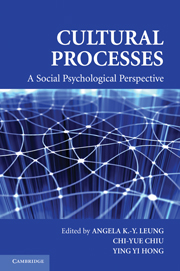Book contents
- Frontmatter
- Contents
- Figures and Tables
- Contributors
- Preface
- Part One Introduction
- Part Two Representational theories of culture
- Part Three Psychological functions of culture
- Part Four Manifestations of cultural processes
- Part Five Transcultural processes
- 12 Bicultural Identity Negotiation
- 13 Multicultural Experiences and Intercultural Communication
- 14 Multicultural Experience Fosters Creative Conceptual Expansion
- 15 Workforce Diversity and Creativity: A Multilevel Analysis
- Index
- References
12 - Bicultural Identity Negotiation
Published online by Cambridge University Press: 05 June 2012
- Frontmatter
- Contents
- Figures and Tables
- Contributors
- Preface
- Part One Introduction
- Part Two Representational theories of culture
- Part Three Psychological functions of culture
- Part Four Manifestations of cultural processes
- Part Five Transcultural processes
- 12 Bicultural Identity Negotiation
- 13 Multicultural Experiences and Intercultural Communication
- 14 Multicultural Experience Fosters Creative Conceptual Expansion
- 15 Workforce Diversity and Creativity: A Multilevel Analysis
- Index
- References
Summary
Increased intercultural contacts within and across national boundaries have raised pressing questions for individuals and societies such as: How do individuals make sense of themselves as multicultural beings? How can societies cultivate the benefits of increased heterogeneity within its populace (e.g., creativity and productivity) and simultaneously resolve possible intergroup tensions? How can social policies be formulated to foster an overarching inclusive identity for all members from different ethnic and cultural backgrounds? Consider the fact that the 2005 riots in France (along with a shorter-lived repeat in 2007), and the terrorist attacks in Britain during the summers of 2005 and 2007, can be partially attributed to ethnic minority youths’ perceived exclusion from the mainstream society (Sciolino, 2007; Smith, 2005). There is no doubt that high rates of unemployment due to racial and religious discrimination, along with perceptions of police insensitivity, combined to fuel weeks of violence and car burnings across France. The anger and frustration felt by French-born and France-identified youth and by young adults of Arab and African ancestry regarding belonging and acceptance had long preceded these events, however. A Time Europe Magazine special report on the cause of the riots provided insight into the tensions behind identity and exclusion: “The young men behind the violence ‘are rioting, not because they hate the Republic,’ says Dounia Bouzar, an anthropologist who has worked extensively with [public housing project] delinquents, ‘but because they want to be included in it’ ” (Geary & Graff, 2005).
Incidents such as the French riots underscore the pressing need to understand identity negotiations within multicultural settings. Although there have been attempts to examine these processes from a psychological standpoint, these issues have yet to be adequately addressed, and the available research is widely scattered within topics such as immigration, mixed-race peoples, ethnic identity, and intercultural communication. In this chapter, we propose a framework for examining bicultural identity negotiation processes, which we consider to be a subset of multicultural identity negotiation. Our objective in introducing this framework is to stimulate further research on this timely topic in the current era of hyperconnectivity within and across national boundaries. Through our model, we also aim to direct attention to the view of bicultural identities as continuously unfolding coconstructions linked to personal resources, situation-embedded goals, and even specific interaction partners.
- Type
- Chapter
- Information
- Cultural ProcessesA Social Psychological Perspective, pp. 213 - 241Publisher: Cambridge University PressPrint publication year: 2010
References
- 1
- Cited by

